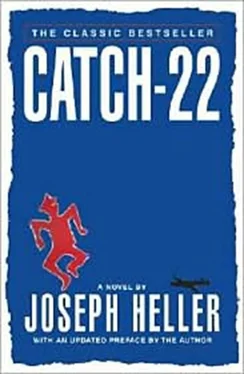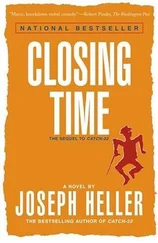On Major Major himself the consequences were only slightly less severe. It was a harsh and stunning realization that was forced upon him at so tender an age, the realization that he was not, as he had always been led to believe, Caleb Major, but instead was some total stranger named Major Major Major about whom he knew absolutely nothing and about whom nobody else had ever heard before. What playmates he had withdrew from him and never returned, disposed, as they were, to distrust all strangers, especially one who had already deceived them by pretending to be someone they had known for years. Nobody would have anything to do with him. He began to drop things and to trip. He had a shy and hopeful manner in each new contact, and he was always disappointed. Because he needed a friend so desperately, he never found one. He grew awkwardly into a tall, strange, dreamy boy with fragile eyes and a very delicate mouth whose tentative, groping smile collapsed instantly into hurt disorder at every fresh rebuff.
He was polite to his elders, who disliked him. Whatever his elders told him to do, he did. They told him to look before he leaped, and he always looked before he leaped. They told him never to put off until the next day what he could do the day before, and he never did. He was told to honor his father and his mother, and he honored his father and his mother. He was told that he should not kill, and he did not kill, until he got into the Army. Then he was told to kill, and he killed. He turned the other cheek on every occasion and always did unto others exactly as he would have had others do unto him. When he gave to charity, his left hand never knew what his right hand was doing. He never once took the name of the Lord his God in vain, committed adultery or coveted his neighbor’s ass. In fact, he loved his neighbor and never even bore false witness against him. Major Major’s elders disliked him because he was such a flagrant nonconformist.
Since he had nothing better to do well in, he did well in school. At the state university he took his studies so seriously that he was suspected by the homosexuals of being a Communist and suspected by the Communists of being a homosexual. He majored in English history, which was a mistake.
“ English history!” roared the silver-maned senior Senator from his state indignantly. “What’s the matter with American history? American history is as good as any history in the world!”
Major Major switched immediately to American literature, but not before the F.B.I. had opened a file on him. There were six people and a Scotch terrier inhabiting the remote farmhouse Major Major called home, and five of them and the Scotch terrier turned out to be agents for the F.B.I. Soon they had enough derogatory information on Major Major to do whatever they wanted to with him. The only thing they could find to do with him, however, was take him into the Army as a private and make him a major four days later so that Congressmen with nothing else on their minds could go trotting back and forth through the streets of Washington, D.C., chanting, “Who promoted Major Major? Who promoted Major Major?”
Actually, Major Major had been promoted by an I.B.M. machine with a sense of humor almost as keen as his father’s. When war broke out, he was still docile and compliant. They told him to enlist, and he enlisted. They told him to apply for aviation cadet training, and he applied for aviation cadet training, and the very next night found himself standing barefoot in icy mud at three o’clock in the morning before a tough and belligerent sergeant from the Southwest who told them he could beat hell out of any man in his outfit and was ready to prove it. The recruits in his squadron had all been shaken roughly awake only minutes before by the sergeant’s corporals and told to assemble in front of the administration tent. It was still raining on Major Major. They fell into ranks in the civilian clothes they had brought into the Army with them three days before. Those who had lingered to put shoes and socks on were sent back to their cold, wet, dark tents to remove them, and they were all barefoot in the mud as the sergeant ran his stony eyes over their faces and told them he could beat hell out of any man in his outfit. No one was inclined to dispute him.
Major Major’s unexpected promotion to major the next day plunged the belligerent sergeant into a bottomless gloom, for he was no longer able to boast that he could beat hell out of any man in his outfit. He brooded for hours in his tent like Saul, receiving no visitors, while his elite guard of corporals stood discouraged watch outside. At three o’clock in the morning he found his solution, and Major Major and the other recruits were again shaken roughly awake and ordered to assemble barefoot in the drizzly glare at the administration tent, where the sergeant was already waiting, his fists clenched on his hips cockily, so eager to speak that he could hardly wait for them to arrive.
“Me and Major Major,” he boasted, in the same tough, clipped tones of the night before, “can beat hell out of any man in my outfit.”
The officers on the base took action on the Major Major problem later that same day. How could they cope with a major like Major Major? To demean him personally would be to demean all other officers of equal or lesser rank. To treat him with courtesy, on the other hand, was unthinkable. Fortunately, Major Major had applied for aviation cadet training. Orders transferring him away were sent to the mimeograph room late in the afternoon, and at three o’clock in the morning Major Major was again shaken roughly awake, bidden Godspeed by the sergeant and placed aboard a plane heading west.
Lieutenant Scheisskopf turned white as a sheet when Major Major reported to him in California with bare feet and mudcaked toes. Major Major had taken it for granted that he was being shaken roughly awake again to stand barefoot in the mud and had left his shoes and socks in the tent. The civilian clothing in which he reported for duty to Lieutenant Scheisskopf was rumpled and dirty. Lieutenant Scheisskopf, who had not yet made his reputation as a parader, shuddered violently at the picture Major Major would make marching barefoot in his squadron that coming Sunday.
“Go to the hospital quickly,” he mumbled, when he had recovered sufficiently to speak, “and tell them you’re sick. Stay there until your allowance for uniforms catches up with you and you have some money to buy some clothes. And some shoes. Buy some shoes.”
“Yes, sir.”
“I don’t think you have to call me ‘sir,’ sir,” Lieutenant Scheisskopf pointed out. “You outrank me.”
“Yes, sir. I may outrank you, sir, but you’re still my commanding officer.”
“Yes, sir, that’s right,” Lieutenant Scheisskopf agreed. “You may outrank me, sir, but I’m still your commanding officer. So you better do what I tell you, sir, or you’ll get into trouble. Go to the hospital and tell them you’re sick, sir. Stay there until your uniform allowance catches up with you and you have some money to buy some uniforms.”
“Yes, sir.”
“And some shoes, sir. Buy some shoes the first chance you get, sir.”
“Yes, sir. I will, sir.”
“Thank you, sir.”
Life in cadet school for Major Major was no different than life had been for him all along. Whoever he was with always wanted him to be with someone else. His instructors gave him preferred treatment at every stage in order to push him along quickly and be rid of him. In almost no time he had his pilot’s wings and found himself overseas, where things began suddenly to improve. All his life, Major Major had longed for but one thing, to be absorbed, and in Pianosa, for a while, he finally was. Rank meant little to the men on combat duty, and relations between officers and enlisted men were relaxed and informal. Men whose names he didn’t even know said “Hi” and invited him to go swimming or play basketball. His ripest hours were spent in the day-long basketball games no one gave a damn about winning. Score was never kept, and the number of players might vary from one to thirty-five. Major Major had never played basketball or any other game before, but his great, bobbing height and rapturous enthusiasm helped make up for his innate clumsiness and lack of experience. Major Major found true happiness there on the lopsided basketball court with the officers and enlisted men who were almost his friends. If there were no winners, there were no losers, and Major Major enjoyed every gamboling moment right up till the day Colonel Cathcart roared up in his jeep after Major Duluth was killed and made it impossible for him ever to enjoy playing basketball there again.
Читать дальше












